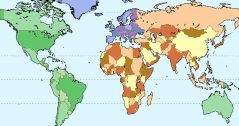|
|
| COMPANIES |
Discover the reality of companies and brands!
|
| TRANSNATIONALE.ORG |
| Free and independant information on large corporations |
Home >BangladeshEconomy, tax incentives & labor conditionsIn Bangladesh, the minimum wage is 24.3 dollars per month in 2008, still below the minimum wage in 1995, taking into account inflation and inferior at least vital estimated at 70 dollars in this country.
The corporate tax rate is 40% on profits.
Private sector workers are discouraged from undertaking any union activity. The Industrial Relations Ordinance gives considerable leeway for discrimination against union members and organisers by employers. Workers who try to create a trade union are not protected before registration and are therefore often persecuted by their employers, sometimes by violent means or with the help of the police. The names of workers who apply for union registration are frequently passed on to employers who promptly transfer or dismiss them, particularly in the textile sector. Even after registration, workers suspected of carrying out trade union activities are regularly harassed. One popular ploy is to dismiss a worker for misconduct, as they are then no longer entitled to become a trade union officer.
Employers in the Export processing zones have been consistently hostile towards trade unions, claiming that many of the companies would be ruined and jobs would be lost if they had to have unions. Some employers in the zones take advantage of the absence of trade unions to commit violations of international labour standards, such as sexual harassment, physical violence, unpaid overtime, child labour, non-compliance with minimum wage regulations and deplorable safety conditions.
All over Bangladesh, union leaders and members were routinely harassed, verbally and physically threatened, beaten, suspended, and fired for pursuing union activities. Most employers operated with total impunity and without regard for legal protections for trade union rights.
Textile workers outside the zones fare no better. An estimated two million women workers toil for 3,300 employers to make clothes for export in Bangladesh. Workers are regularly sacked, beaten or subjected to false charges by the police for being active in unions. The General Secretary of the United Federation of Garment Workers (UGFW) has been arrested more than a dozen times. Meanwhile, the country’s garment workers are among the lowest paid in the world. They work long hours with very little leave, and face physical, verbal and sexual abuse.
Employers in the Export processing zone routinely harassed, intimidated, suspended and fired the leaders of the Worker Representation and Welfare Committees.
The right to freedom of association and to collective bargaining at the workplace is not respected in the garment sector or on the tea estates.
The Bangladeshi ship recycling industry is based at Chittagong Port. Workers are employed on an as-needs basis, have no contracts and do not sign any documents which could link them to a specific yard. Thus workers have no legal recourse in the event of a dispute. Largely owing to the fear instilled in them – through violence and the precariousness of their employment situation - workers have no way of standing up for their rights or even claiming their dues. Any claim would provoke instant dismissal. Unions are de facto forbidden on the sites and union organisers find it very difficult to gain access.
Minimum wage noted (US$/day)
2007 4 US$/day at/for Lafuma |
translate this page in arabic chinese dutch german japanese korean russian
Legal notice © T&C 1999-2010
| CONTRIBUTIONS |

